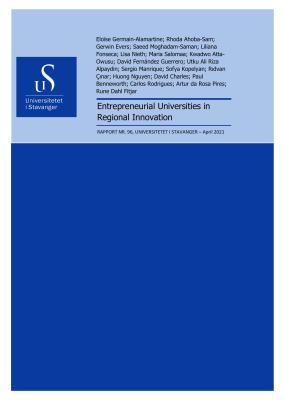Entrepreneurial Universities in Regional Innovation
Keywords:
testSynopsis
This book is the result of a European Union funded Marie Skłodowska-Curie Actions Innovative Training Network on the Role of Universities in Innovation and Regional Development (RUNIN). The network received funding from 2016 to 2020 and supported 14 early-career researchers who undertook their doctoral training in the network. It builds on the collaboration between the universities in the European Consortium for Innovative Universities (ECIU), of which six of the participant teams are members. The universities in the ECIU share an ambition to promote innovation and to work closely with their regions. The RUNIN programme brings together scholars working on higher education, innovation and regions in order to study how the universities realise this ambition. The project aims to provide new knowledge for other universities and policy-makers on how universities can contribute to innovation in their regions. The programme includes a university and a regional development agency in each region as partners in order to examine the relationship between universities and their regions from both perspectives.
The programme involved international mobility both before and during the programme. All early-career researchers moved from abroad to the university and region in which they were employed. The 14 researchers in the programme came from 12 different countries on four continents. They could thus bring an outsider’s perspective on the universities and the regions. This book presents those perspectives. It includes seven case studies authored by the early-career researchers working at each university, in which they analyse the relationship between the university and its surrounding region.
The case studies show the wide array of roles which universities can take in their regions. Even though the universities share the same ambition and, as members of the ECIU, have similar profiles, the regional and national contexts in which they find themselves have implications for the types of activities which they do, the effects of these activities, and the way in which they are received both at the university and in the surrounding region.
Work on this book started during the first training week of the project, hosted by the University of Lincoln in March 2017, when the researchers had started their PhDs only weeks or even days before. It ends as the programme draws to a conclusion, following an extensive programme of training weeks in all seven regions, several conference special sessions, joint publications, exchanges and successful PhD defences. It has been an honour to work with such a great group of promising researchers and inspiring supervisors through the process. The scholars in the RUNIN programme share an interest in studying universities and regions, but also in actively engaging with stakeholders, in communicating their research in new ways, and in contributing to the betterment of society. During the course of the programme, the network has evolved into deep collaboration and close friendships, where all participants have contributed to a supportive atmosphere.
We hope this book will reflect that collaboration and will be of use to university managers, policymakers, academics and students who want to know how universities can contribute to their regions. The universities and regions presented here are all, in their unique ways, interesting examples of the multi-faceted nature of this relationship.


